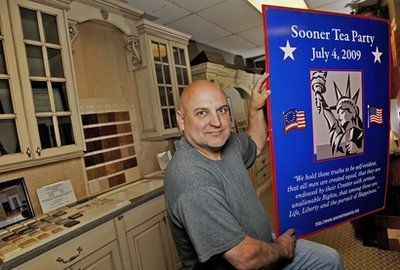Asia-Pacific
Okla. tea parties and lawmakers envision militia
(Agencies)
Updated: 2010-04-13 17:09
 |
Large Medium Small |
 Al Gerhart, co-founder of the Sooner Tea Party and founder of Oklahoma Constitutional Alliance, is shown in the showroom of his business, The Carpenter Shop, holding a 'Sooner Tea Party' poster from their 2009 convention, Monday, April 12, 2010, in Oklahoma City. [Agencies] |
|
||||
"Is it scary? It sure is," said tea party leader Al Gerhart of Oklahoma City, who heads an umbrella group of tea party factions called the Oklahoma Constitutional Alliance. "But when do the states stop rolling over for the federal government?"
Thus far, the discussions have been exploratory. Even the proponents say they don't know how an armed force would be organized nor how a state-based militia could block federal mandates. Critics also asserted that the force could inflame extremism, and that the National Guard already provides for the state's military needs.
"Have they heard of the Oklahoma City bombing?" said Joseph Thai, a constitutional law professor at the University of Oklahoma. The state observes the 15th anniversary of the anti-government attack on Monday. Such actions could "throw fuel in the fire of radicals," he said.
But the militia talks reflect the frustration of some grass roots groups seeking new ways of fighting recent federal initiatives, such as the health reform plan, which requires all citizens to have health insurance. Over the last year, tea party groups across the country have staged rallies and pressured politicians to protest big government and demand reduced public spending.
In strongly conservative states like Oklahoma, some legislators have also discussed further action to fight federal policies, such as state legislation and lawsuits.
State Sen. Randy Brogdon, R-Owasso, a Republican candidate for governor who has appealed for tea party support, said supporters of a state militia have talked to him, and that he believes the citizen unit would be authorized under the Second Amendment to the Constitution.









